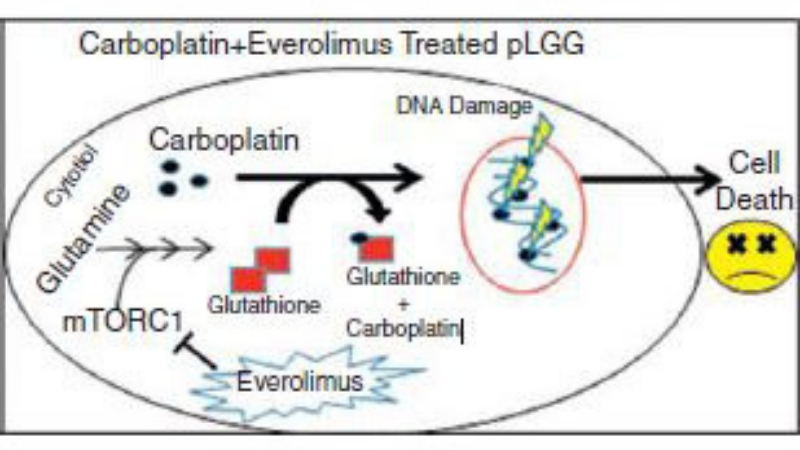Drug Combination for Pediatric Low-grade Glioma
Scientists at the Johns Hopkins Kimmel Cancer Center and the Johns Hopkins University School of Medicine have developed a new drug combination treatment targeted at resistant and recurrent low-grade gliomas particularly in pediatric populations.

"We found that everolimus disrupted a key mechanism the cancer cells use to detoxify carboplatin. The ability of everolimus to increase the power of carboplatin suggests this combination could be used effectively in patients."

The introduction of everolimus with carboplatin treatment induces DNA damage in tumor cells and kills them. Credit: Johns Hopkins Kimmel Cancer Center
Findings of the drug combination study were published Neuro-Oncology and show increased DNA damage in tumor cells followed by cell death in laboratory models. The drug combination showed similar results in mouse models with no added toxicity.
In pediatric low-grade glioma, the most common form of brain tumors in children, surgical interventions for treatment are risky and can affect near optic nerves. However, the drug combination could serve as an effective treatment option.
"The current nationwide clinical study of everolimus in pediatric low-grade glioma requires that some tumor tissue from each patient be evaluated for expression of mTOR markers that might predict response to everolimus," Raabe says. "In this way, we hope to figure out who is most likely to respond to the drug, so that we can move closer to our goal of giving the right medicine to the right patient at the right time. In the future, we may be able to give everolimus along with carboplatin to patients with high-level mTOR expression. Based on our research, we predict that these tumors will likely be resistant to carboplatin unless we simultaneously block mTOR."
Source: John Hopkins Medicine
-
APR 30, 2024Immuno-Oncology Virtual Event Series 2024
-
MAY 07, 20243rd International Biosecurity Virtual Symposium
-
JUN 06, 2024The Future of Scientific Conferencing
- See More

















































